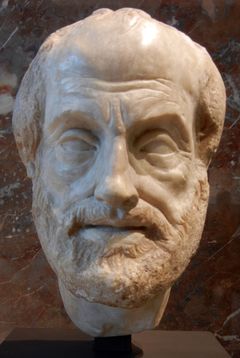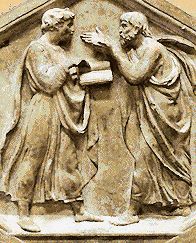
Greco-Roman Statue of Aristotle (Musée du Louvre)
Content created: 2015-08-28
File last modified:
Aristotle’s was the greatest mind ever to occupy a human skull. I have spoken!

Having acknowledged that, I need also to admit that he made lots of mistakes, some of which needlessly bedeviled western thought for nearly two thousand years. (He argued that the brain exists merely to cool the blood, for example, and is not involved in thinking.) Aristotle was a product of his time and his place, but intellectually he was perhaps their most glorious product.
Aristotle speculated and pontificated and reasoned with confidence on all topics from politics to physics and from ethics to literature. He was a student of Plato. (He is shown in the bas relief below as a young whippersnapper holding a book and arguing with his somewhat defensive teacher. Young whippersnappers do that —very few of them turn out to be Aristotle.) Aristotle was himself the teacher of Alexander the Great, or such is the tradition. (Click here for slightly more, very brief biographical detail.)
These historical connections would be enough to guarantee him a place of interest in the history of Greek and later Roman thought, but the interest is much greater because we have extensive examples of his work. And indeed, he remained an influential figure in Jewish, Christian, and Islamic thinking throughout the middle ages and Renaissance and at least until the Enlightenment. When I started college, a copy of Richard McKeon’s Introduction to Aristotle was compulsory reading in about half of all our Gen Ed courses.

Aristotle himself would probably have been flattered by the adulation paid him by later eras, but would also have been appalled. Confident though he may have been in his own reasoning, he pretty clearly did not believe in letting errors prevail merely because they were ancient or explanations stand when better ones could be demonstrated.
Plato and Aristotle (or “Plato-and-Aristotle”) are honored today as the greatest and most influential philosophers in world history. Each of them would, of course, be happy to debate what “greatness” means. The issue of influence seems beyond debate, even for them.
A brief overview of the ancient world (such as is provided in a typical college world-civ course) cannot do justice to most of the topics it covers, and this especially hurts in the case of a great ancient writer like Aristotle. HOWEVER, acknowledging that, two wee passages are included here. The first, from his Meteorology (Μετεωρολογικά), discusses the nature of rainbows. The second, from his Poetics (Περὶ Ποιητικῆς), discusses how art works. The first provides a reasonably representative example of how Aristotle reasoned and argued. The second (1) is one of my favorite texts and (2) introduces an idea (in line 3) that turns out to resonate with the very latest cognitive research going on at UCSD. If I were to pick a third selection, it would be one of his many texts on logic or on ethics or on the organization of human society.
For more about Aristotle, check out the excellent Wikipedia article about him (link). For an on-line video biography (after an initial ad), click here. (Caution: some browsers are finicky about video players. You may need to switch browsers.)
Interactive quizzes are available to doublecheck your understanding of these pages. They are linked at the end of each reading.